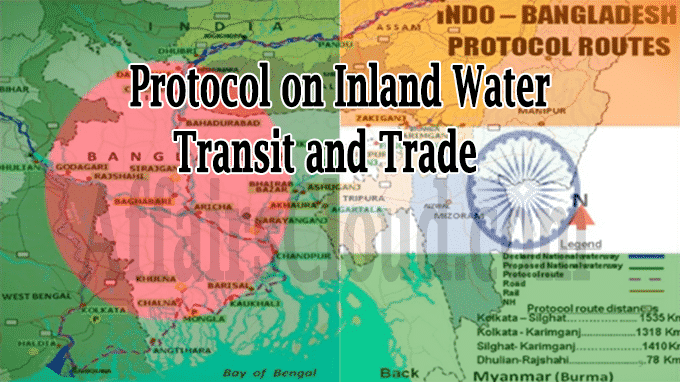
- It was signed by the High Commissioner of India in Bangladesh, Riva Ganguly Das, and Bangladesh Shipping Secretary Mohammad Mezbah Uddin Chowdhury.
Ports
New Ports– The new ports of call in India are Dhulian, Moya, Kolaghat, Sonamura and Jogigopha & in Bangladesh will be Rajshahi, Sultanganj, Chilmari, Daudkandi and Bahadurabad
- Inclusion of Jogigopha and Bahadurabad will provide connectivity to Meghalaya, Assam and Bhutan. Jogigopha also becomes important, since a Multimodal Logistics Park is proposed to be established there.
Significance of new ports
The new Ports of Call will enable the loading and unloading of cargo transported on the Indo Bangladesh Protocol Route and provide a stimulus to the economic development of the new locations and their hinterland.
Extended Ports are: In India- Tribeni (Bandel) will be under Kolkata Port of Call and Badarpur will be under Karimganj Port of Call. In Bangladesh- Ghorashal under Narsingdi district will be under Narayanganj Port of Call and Moktarpur under Munshigaj district will be under Pangaon Port of Call
Existing ports of call: In India- Kolkata, Haldia, Karimganj, Pandu, Shilghat and Dhubri. In Bangladesh- Narayanganj, Khulna, Mongla, Sirajganj, Ashuganj and Pangaon
Routes
The inclusion of Sonamura (India)- Daudkandi (Bangladesh) stretch of Gumti river (93 Km) as IBP route No. 9 & 10 in the protocol will improve the connectivity of Tripura and adjoining States with Indian and Bangladesh`s economic centres and will help the hinterland of both the countries. This route shall be connecting all existing IBP routes from 1 to 8.
Key Points
i.Under this Protocol, Inland vessels of both the countries can ply on the designated protocol route and dock at Ports of Call in each country, notified for loading/unloading of cargo.
ii.There is significant improvement in the movement of cargo vessels in an organized manner on the protocol route carrying both the transit cargo to the North East(NE) region of India and vice-versa and export-cargo to Bangladesh.
iii.The Indian transit cargo is- mainly coal, fly-ash, POL and ODC for power projects in NE region. Fertilizers, cement, food grains & agricultural products are among other potential cargo for movement
iv.The export cargo from India to Bangladesh is mainly fly-ash which is to the tune of 30 lakhs MT per annum. Around 638 inland vessels (including 600 Bangladeshi flag vessels) completed annually with about 4000 loaded voyages.
v.The modifications will facilitate trade between two countries with improved reliability and cost effectiveness.
Use of shallow draft mechanized vessels
Both countries have agreed to introduce trade between Chilmari (Bangladesh) and Dhubri (India) through the use of shallow draft mechanized vessels, provided these are registered under Inland Shipping Ordinance 1976 of Bangladesh or Inland Vessels Act, 1917 of India as per provisions of Article 1.3 of the Protocol and conform to safety requirements.
Significance– Will allow export of stone chips and other Bhutanese and North East cargo to Bangladesh and easy access for the traders to the hinterland of Bangladesh, enhancing the local economy in Bangladesh and the lower Assam region of India.
Background
i.This Protocol, which was first signed in 1972 (immediately after independence of Bangladesh) and since then the two countries have renewed the agreement through PIWTT (Protocol on Inland Water Transit and Trade).
ii.It was last renewed in 2015 for 5 years with a provision for its automatic renewal for a further period of five years giving long term assurance to various stakeholders.
iii.During the discussions between India and Bangladesh at these meetings held in October, 2018 in New Delhi and in December 2019 in Dhaka, key decisions were taken on the extension of protocol routes, inclusion of new routes and declaration of new Ports of Call. These decisions have been made effective with the signing of the 2nd Addendum to the Protocol.
What is “Port of call”?
As per the shipping Monitoring, Reporting and Verification(MRV) regulation, a “port of call” can be defined as the port of a country where cargo or a passenger (cruise) ship halts to discharge or load the cargo or to embark or disembark passengers.
About Bangladesh:
Capital– Dhaka
Currency– Bangladeshi Taka
Prime Minister– Sheikh Hasina
President– Abdul Hamid